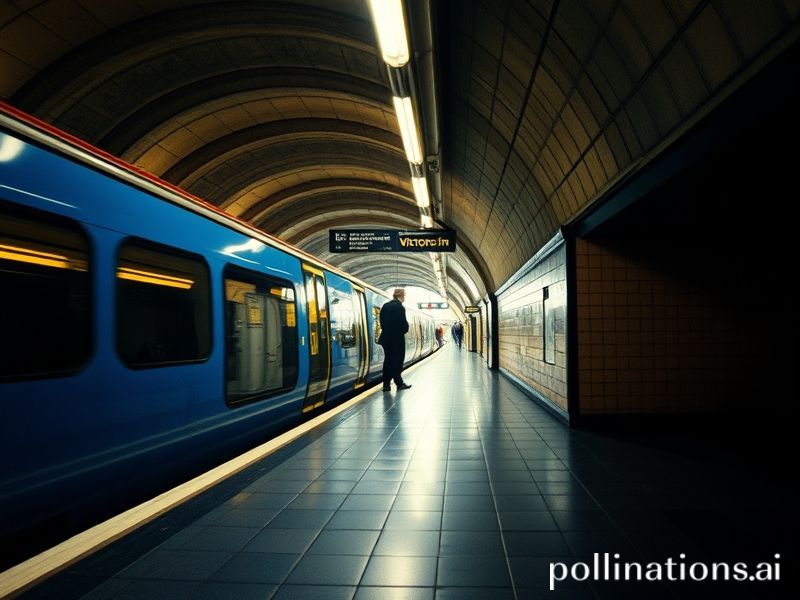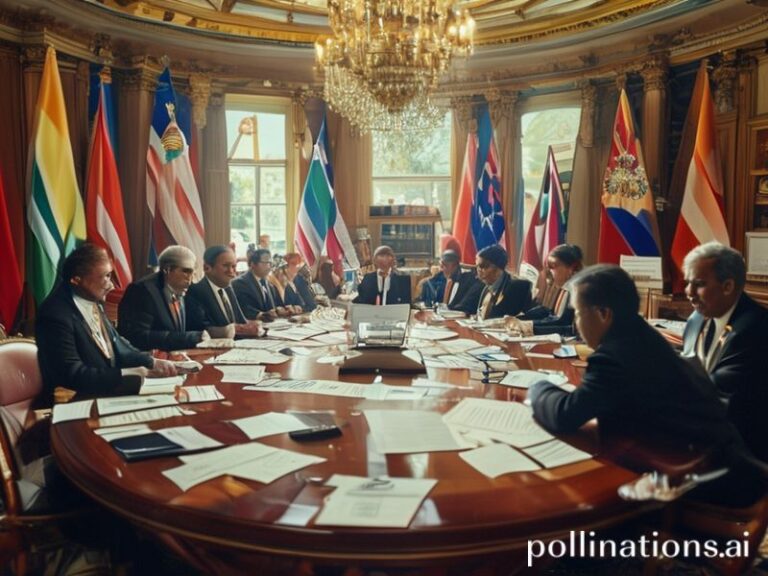Victoria Line: London’s Underwhelming Tube Becomes the World’s Favourite Metaphor for Modern Life
The Victoria Line: London’s Tube of Mild Existential Despair Finds New Global Fans
By Ludo Vickers, International Correspondent, somewhere between Pret and Pret
In the grand taxonomy of urban transit, the Victoria Line is what happens when a city decides to build an artery but accidentally installs a vein. Opened in 1968, it was meant to be the bold future: automatic trains, brisk journey times, no-nonsense grey livery that whispered “post-war efficiency” while secretly screaming “we’ve run out of paint.” Fifty-six years on, it has become the darling of TikTokers from São Paulo to Seoul, who film themselves hurtling from Brixton to Walthamstow in 32 minutes flat—roughly the same duration it takes an Italian coalition to collapse.
Why the sudden international infatuation? Simple: the Victoria Line is the perfect metaphor for our age—fast, overcrowded, and faintly disappointed in itself. While Beijing’s maglev glides at 430 km/h and Dubai’s driverless pods sparkle like Gulf-state Christmas ornaments, the Victoria Line still relies on a signalling system that appears to be operated by a Commodore 64 running on a diet of spite. And yet, in an era when the planet is either on fire or underwater, there is perverse comfort in a train that is merely perpetually late and slightly sticky.
Global investors have noticed. Pension funds from Toronto to Tokyo now treat TfL bonds as a kind of secular rosary: rub them whenever the S&P sneezes. The line’s ability to move 250 million passengers a year without actually improving anyone’s mood is viewed in Frankfurt boardrooms as a masterclass in resilient mediocrity—an asset that never quite fails, much like the euro. Analysts at Goldman have coined the term “Victoria Premium,” a valuation uplift given to any infrastructure project that can promise 2 % annual growth and existential dread.
Meanwhile, geopolitical chatter has grown louder. Washington think-tankers muse whether the line’s chronic under-capacity could be weaponised: imagine a minor signal failure at Victoria—say, a Tuesday—cascading into such commuter rage that Britain misses a NATO summit. (Pentagon wargamers have apparently run the simulation; it ends with everyone agreeing to reschedule and pretending it never happened.) The Chinese ambassador was reportedly overheard calling the line “a cautionary tale of imperial underinvestment,” which is rich coming from a country that still thinks “rush hour” is quaintly British.
Culturally, the Victoria Line has become a meme among Gen-Z ex-pats who treat Oyster cards like rosaries of secular identity. Berlin DJs sample its door chime—an F-sharp that sounds like a sigh—into lo-fi tracks titled “Northern Fail Soul.” In Lagos, ride-hailing drivers joke that Victoria’s chronic congestion is what happens when you let colonial ghosts design logistics. Even Moscow’s metro—cathedral of proletarian grandeur—has begun running adverts depicting a Victoria Line carriage where everyone is silently reading, a dystopian horror scenario for Russians used to accordionists and heated arguments about Dostoevsky.
Of course, no international profile is complete without climate guilt. The line’s electricity is now 100 % renewable, a fact TfL trumpets louder than a Brexit bus, yet the carbon savings are promptly negated by the 400-metre queue for cinnamon buns at King’s Cross. Greta Thunberg, asked for comment, simply tweeted the 🤦♀️ emoji, which translates across all languages as “we’re doomed, but at least the Wi-Fi sort of works.”
In the end, the Victoria Line is what the world has decided it deserves: a rapid transit system that delivers you from nowhere-in-particular to somewhere-else-in-particular, slightly later than promised, smelling of someone else’s coffee and your own compromised dreams. It is not the future we were promised, but it is the future we keep boarding, tapping in with the blind optimism of a species that still believes the next train will be less crowded. It won’t be. But we’ll be on it anyway, earbuds in, scrolling headlines about the collapse of everything, while somewhere between Green Park and Highbury & Islington, the announcer apologises for the “slight delay,” and the entire carriage nods in collective, global recognition of the gentle, familiar farce.







